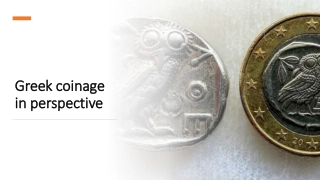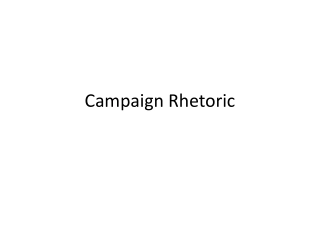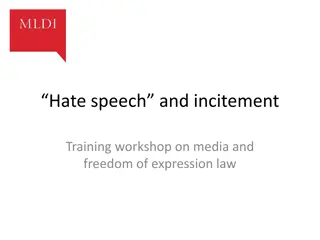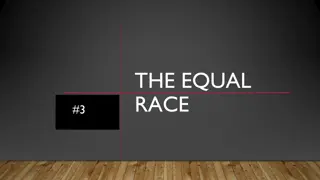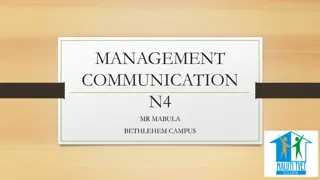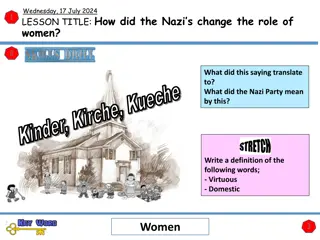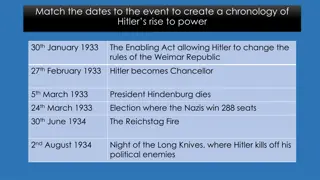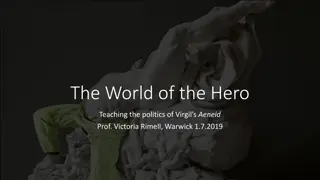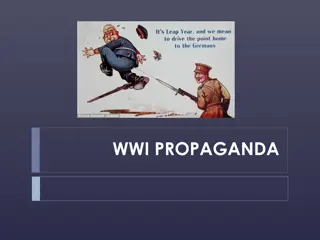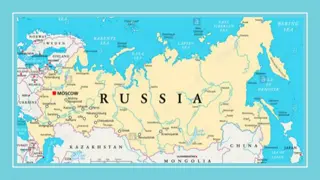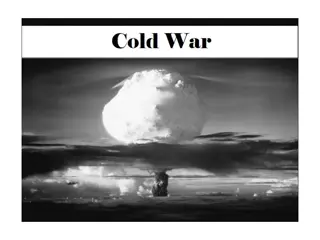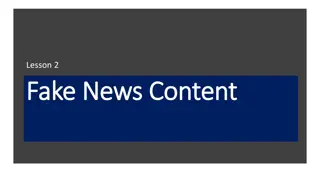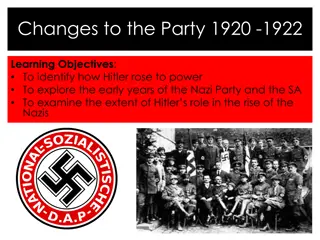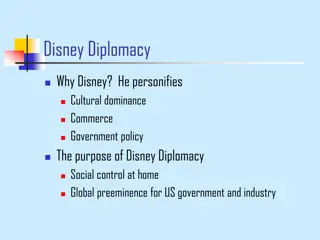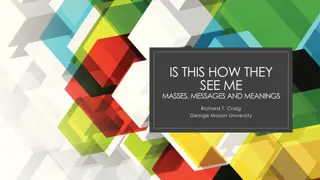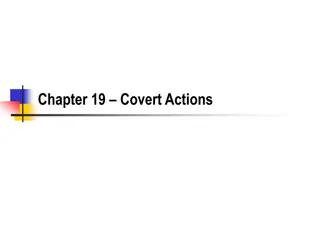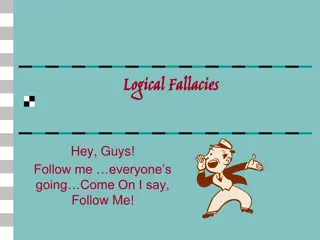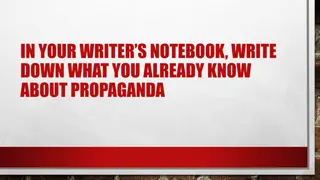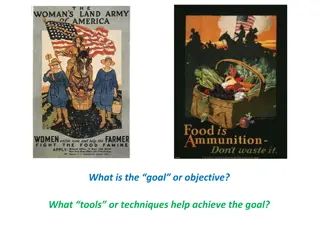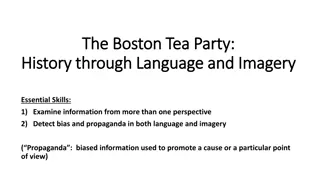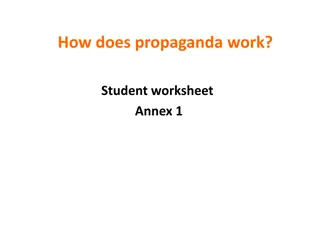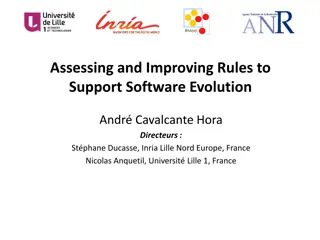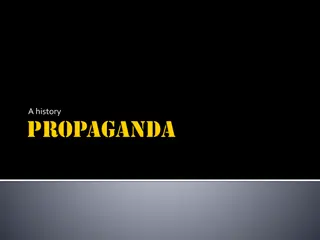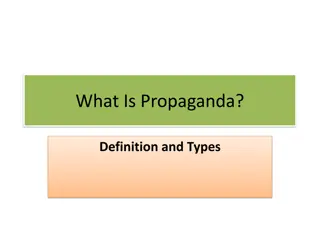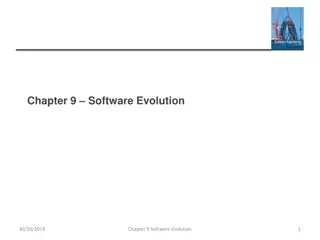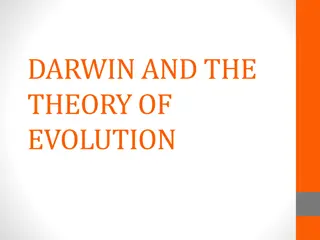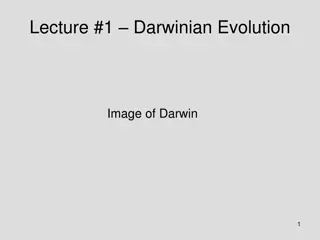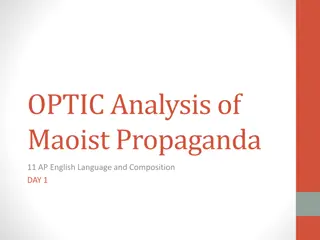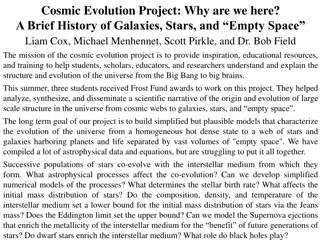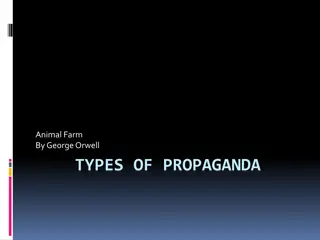Greek coinage in perspective
Explore ancient Greek coinage practices and their modern parallels. Discover attitudes, practices, and the intersection of money with propaganda throughout history.
1 views • 30 slides
Campaign Rhetoric
Rhetoric, the art of persuasive language use, plays a crucial role in political campaigns, focusing on public speaking to sway audience opinions. The ethical implications, such as the use of noble ideas versus dishonest strategies, are also key considerations. Factors affecting persuasiveness includ
0 views • 51 slides
Understanding Hate Speech and Incitement in Media and Freedom of Expression Law
This workshop explores the legal implications surrounding hate speech, incitement, and freedom of expression. It delves into the prohibition of propaganda for war, advocacy of hatred, and the balance between state obligations and freedom of speech. Through case law examples like the Jersild case and
1 views • 12 slides
Exploring Symbolism Through Art: Lessons from The Equal Race Mural Project
The presentation outlines "The Equal Race" mural project by Julie Hussey, Alia Oakes, Teagan Tate, and Audrey Thompson, inspired by the Holocaust. It delves into the project's core themes, including hope, despair, and resilience, depicted through a mural featuring a Jewish family, Nazi propaganda, a
1 views • 10 slides
Understanding Mass Media and Advertising in Management Communication N4
Explore the role of mass media and advertising in communication processes, including types of media, functions of mass media, language choices, manipulative reporting, propaganda techniques, advertising principles, and effective advertising requirements. Engage in various activities to enhance learn
3 views • 6 slides
Women's Role in Nazi Germany: Impact and Ideology
Explore how the Nazis shaped the role of women through policies and propaganda, emphasizing domesticity and motherhood. Analyze key figures like Joseph Goebbels and Hitler's perspectives on women's place in society. Understand the contrast between women's lives in Weimar and Nazi Germany.
0 views • 18 slides
The Rise of Hitler: Establishing the Nazi Police State in Germany
This content chronicles the key events leading to Hitler's rise to power in Germany, focusing on the establishment of the Nazi Police State through propaganda, surveillance, and punishment. It discusses Hitler's use of violence, propaganda, and speeches to solidify his control. The effectiveness and
0 views • 9 slides
Understanding Dystopian Societies in 1984 Novel Guide
Explore the themes of utopia and dystopia in George Orwell's 1984 novel through a comprehensive guide. Learn about the characteristics of dystopian societies, types of controls, and the role of protagonists in challenging oppressive systems. Dive into the discussions on propaganda, surveillance, deh
0 views • 10 slides
Retrieval Practice in Animal Farm: Lessons on Communism, Allegories, and Propaganda
In this detailed study guide, explore key themes from George Orwell's "Animal Farm", focusing on topics like the Communist Manifesto, bourgeoisie representation, capitalism vs. communism, rhetorical strategies, Karl Marx, fables, anthropomorphism, allegories, Russian Revolution parallels, and the us
1 views • 20 slides
Exploring the Politics and Ideals in Virgil's Aeneid
Delve into the complexities of divine intervention, Roman values, and Augustan heroism in Virgil's Aeneid. Unravel the intricate relationship between politics, epic form, and the subversive readings of this classical work. Challenge traditional interpretations and ponder the nuanced interplay of pro
0 views • 11 slides
Understanding Wartime Propaganda in WWI
Wartime propaganda during WWI was employed for various purposes such as recruiting soldiers, financing the war effort, and unifying the country. It used tools like demonization, emotional appeals, patriotic appeals, and half-truths to sway public opinion and support the war. An in-depth analysis of
0 views • 7 slides
The Ruthless Reign of Joseph Stalin in the Soviet Union
Joseph Stalin rose to power in the USSR after Lenin's death, implementing totalitarian control through purges, collectivization, and propaganda. His regime led to millions of deaths, forced labor camps, and a cult of personality, shaping Soviet society through fear and oppression.
0 views • 8 slides
The Cold War: Rivalry and Tension Between Superpowers
The Cold War, lasting from post-World War II to the 1980s, was defined by political tension and rivalry between the United States and the Soviet Union. Despite never engaging in direct military combat, both sides competed through political maneuvering and propaganda, impacting global conflicts and t
0 views • 11 slides
Understanding the Different Types of Misinformation and Fake News
Explore the various forms of misinformation such as fake news, satire, fabrication, manipulation, propaganda, and dissemination. Learn how fake news impacts public perception and how it can mislead individuals. Discover the prevalence of fake news and its effects on society.
2 views • 11 slides
The Rise of Hitler and the Changes in the Nazi Party 1920-1922
Explore how Adolf Hitler ascended to power and examine the significant developments within the Nazi Party between 1920 and 1922, including Hitler's role, the creation of the SA, the 25 Point Programme, Hitler's leadership, and the use of propaganda and violence.
0 views • 13 slides
Disney Diplomacy: Cultural Influence and Political Objectives
Disney's role in diplomacy, particularly in South America, reveals a complex interplay between cultural dominance, commercial interests, and government policies. The Good Neighbors Office aimed to counter German propaganda through positive American portrayal, but overlooked cultural differences and
4 views • 8 slides
The Transition from Rural Community to Urban Mass Society: Impact of Media Technologies
Our lives are influenced by the saturation of media technologies and images, leading to questions on American culture and politics. The shift from rural community to urban mass society has resulted in individuals being isolated and disconnected from traditions and values, shaping their hearts and mi
0 views • 16 slides
Covert Actions and Their Consequences
The chapter discusses foreign covert actions, their limited statutory control, and the President's discretion in carrying them out. It delves into the Bay of Pigs incident, forms of covert actions like propaganda and paramilitary actions, unintended consequences, and the Neutrality Act of 1794. The
1 views • 31 slides
Understanding Logical Fallacies and Persuasion Techniques
Learn about logical fallacies, persuasive writing, propaganda, and types of fallacies with examples like circular reasoning and false causality. Recognize how persuasive texts aim to influence readers and the importance of critical thinking when encountering different argumentative strategies.
0 views • 31 slides
Understanding Propaganda Techniques
Explore different propaganda techniques such as Name-Calling, Bandwagon, Red Herring, Emotional Appeal, Testimonial, Repetition, Sweeping Generalization, and Circular Argument. These techniques manipulate people's emotions and perceptions to influence their decisions. Be vigilant against these strat
0 views • 26 slides
Analyzing Wartime Propaganda Objectives and Techniques
Explore the objectives and tools utilized in wartime propaganda, including recruitment of soldiers, financing war efforts, unifying nations behind a cause, resource conservation, and fostering home-front support. Delve into common techniques like demonization, emotional appeals, name calling, patrio
0 views • 22 slides
Evolution of Compact Star-Forming Galaxies and Quiescent Galaxies
The evolution of galaxies from compact star-forming to quiescent states involves processes such as secular evolution, gas inflows, and star formation quenching. By studying the structural relations and star formation in these galaxies, insights are gained into their transition towards quiescence. Th
0 views • 12 slides
Analyzing Bias and Propaganda in Boston Tea Party History
Explore the Boston Tea Party through language and imagery, learning to examine information from multiple perspectives and detect bias and propaganda. Engage with visual materials, such as political cartoons, and texts like the 1773 Massachusetts Gazette article to determine if they were created by p
0 views • 10 slides
Understanding the Mechanisms of Propaganda Through Historical Examples
Explore the workings of propaganda through historical artifacts from World War I, showcasing how nations used persuasive messaging to influence public opinion, rally support for war efforts, and shape cultural narratives. Images of propaganda posters and war bonds illustrate the powerful impact of v
0 views • 24 slides
The Scopes Monkey Trial: Clash of Cultures and Evolution Debate
Following World War I, the Scopes Monkey Trial in Tennessee marked a pivotal clash between urban and rural cultures over the teaching of evolution. The trial, prosecuted by William Jennings Bryan and defended by Clarence Darrow, resulted in teacher John Scopes being found guilty of violating the ant
0 views • 9 slides
Rules and Practices for Software Evolution Support
This content focuses on the importance of rules and practices to support software evolution, addressing challenges, benefits, and impact on ecosystems. It emphasizes the need for system-specific rules, automatic extraction of conventions, and client support. The evolution of software is highlighted
0 views • 65 slides
The Evolution of Propaganda: From the 1600s to Hitler's Regime
The term "propaganda" originated in the 1600s without a negative connotation until World War I when it became a tool of persuasion and manipulation. Countries utilized propaganda extensively during WWI to sway public opinion. The United States established a propaganda bureau, while Nazi Germany saw
0 views • 32 slides
Lessons from Rwanda: Hatred, Propaganda, and War
Explore the dark era of the Rwandan Genocide, delving into the themes of hatred, propaganda, and warfare. Learn about the use of propaganda in influencing people and its impact during the conflict. Follow the timeline of events leading up to the genocide and the efforts for ceasefire amid escalating
0 views • 5 slides
Understanding Propaganda: Definition, Examples, and Impact
Propaganda is a form of communication that aims to influence the attitudes of a population towards a cause or position. It can be used to manipulate information selectively, evoke emotional responses, and shape perceptions. This article explores the definition of propaganda, its historical context,
0 views • 17 slides
Software Evolution: Managing Change and Evolution in Organizational Systems
Software evolution is an essential process for organizations to maintain the value of their critical business assets. It involves adapting to new requirements, addressing errors, and enhancing performance. The majority of software budgets in large companies are dedicated to evolving existing systems
0 views • 61 slides
Darwin and the Theory of Evolution: A Comprehensive Overview
Darwin's Theory of Evolution encompasses the concepts of organisms changing over time and life evolving through natural selection. Influenced by scientists such as James Hutton, Jean Baptiste Lamarck, and Alfred Russel Wallace, Darwin's theory culminates in the idea of evolution by natural selection
0 views • 9 slides
Understanding Evolution: Key Concepts and Perspectives
Explore the concepts of Darwinian evolution, evidence for evolution, Darwin's theory, and the Modern Synthesis. Delve into the spiritual versus intellectual perspectives, the diversity of religious affiliations globally, and the compatibility of faith and science in understanding the natural world a
0 views • 91 slides
Understanding Maoist Propaganda Through OPTIC Analysis
Explore the use of OPTIC analysis to dissect Maoist propaganda posters from the Chinese Cultural Revolution. Uncover the hidden messages and visual rhetoric employed by the government to influence perceptions and promote certain ideologies.
0 views • 25 slides
Unveiling the Cosmic Evolution: A Journey Through Galaxies, Stars, and Empty Space
Delve into the intricate story of the universe's evolution from its hot dense origins to the vast cosmic web of stars and galaxies. Explore questions on stellar birth rates, interstellar medium influences, and the role of dark energy. Follow the journey of three students working on the Cosmic Evolut
0 views • 30 slides
Understanding Evolution: Key Concepts and Perspectives
Explore the key concepts of Darwinian evolution, including evidence for evolution, Darwin's theory, and the Modern Synthesis. Reflect on the relationship between spiritual and intellectual perspectives, emphasizing that different ways of thinking can complement each other. Discover the diversity in
0 views • 91 slides
Understanding Political Spin and Propaganda in Media
Explore the tactics of political spin and propaganda as tools used to shape public perception and manipulate information. Learn about the techniques politicians employ to navigate media dynamics and the covert spin tactics employed in the realm of communication and journalism.
0 views • 10 slides
Visualizing Ontology Evolution for Improved Knowledge Management
Ontologies are dynamic entities that evolve over time, impacting semantically-enabled applications and knowledge acquisition. This work focuses on identifying desired functionalities for ontology evolution systems, highlighting the steps involved in ontology evolution, and emphasizing the importance
0 views • 16 slides
Evolution of Indo-European Languages through Phylogeny Estimation
Explore the evolution of Indo-European languages through phylogeny estimation under a model of linguistic character evolution. Follow the Computational Historical Linguistics Project's collaboration that began in 1994, leading to the development of methods and studies on homoplasy-free evolution and
0 views • 61 slides
Types of Propaganda Techniques in Animal Farm by George Orwell
Explore different propaganda techniques illustrated in George Orwell's novel, Animal Farm, including bandwagon, testimonial, repetition/hypnotism, plain folks, ego building/snob appeal, emotional words/patriotic slogan, and value/durability. Learn how these techniques manipulate perceptions and shap
1 views • 12 slides
Overview of Nazi Propaganda and Control Methods
The content discusses different types of Nazi propaganda, the reasons behind Kristallnacht, and the effectiveness of terror as a control method by the Nazis. It highlights how propaganda, violence, and fear were utilized to manipulate and suppress the German population during the Nazi regime.
0 views • 8 slides
